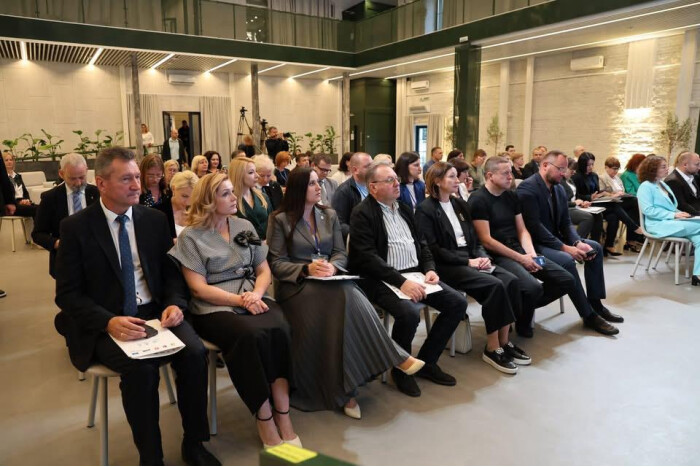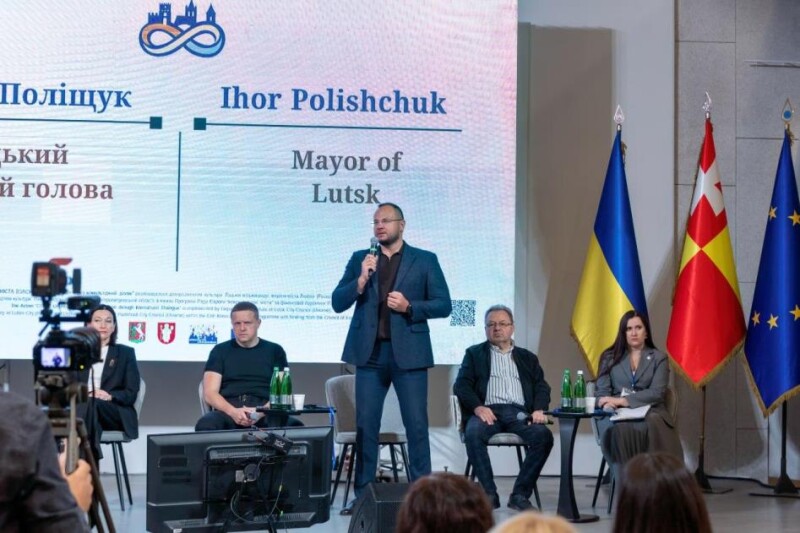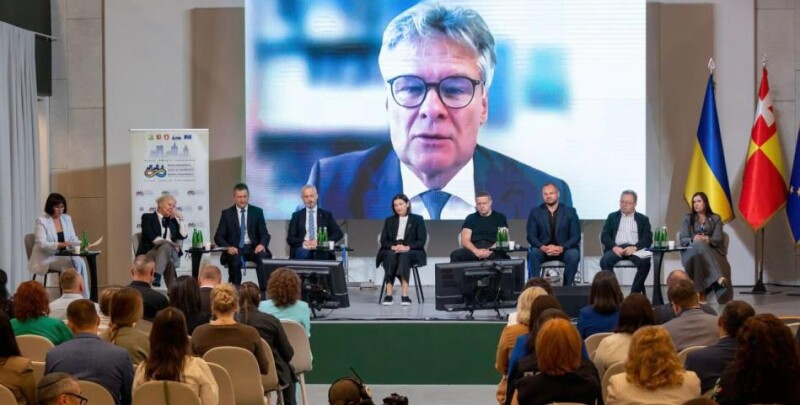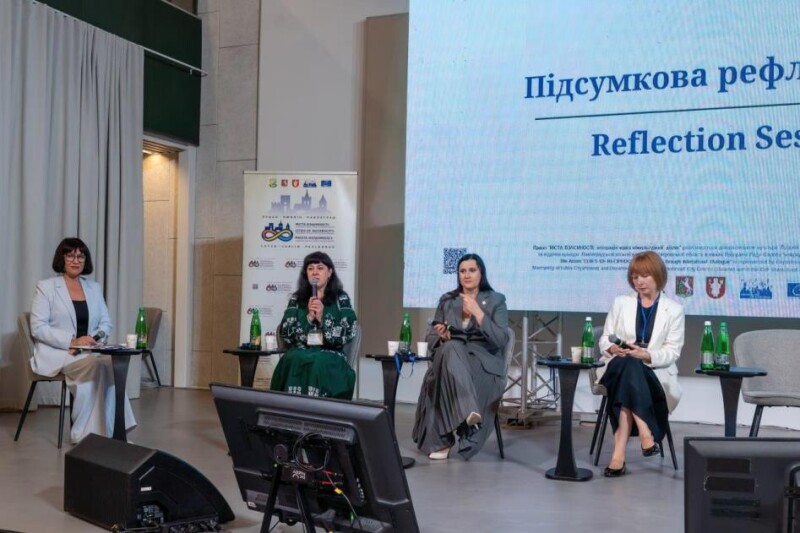Intercultural forum “Cities of Reciprocity: Intercultural Dialogue as a Path to Unity” was held in Lutsk

On 12 September 2025, the intercultural forum “Cities of Reciprocity: Intercultural Dialogue as a Path to Unity” took place in Lutsk, at the business space and online, within the framework of the project “Cities of Reciprocity: Integration through Intercultural Dialogue”. The project is implemented by the Department of Culture of the Lutsk City Council in partnership with the cities of Lublin (Poland) and Pavlohrad (Ukraine). The event is supported by the Council of Europe’s Intercultural Cities Programme (ICC) and funded by the Council of Europe. The forum brought together more than 100 participants from different regions of Ukraine and Europe.
The aim of the forum was to create a platform for dialogue between cities, to develop effective approaches to the integration of internally displaced persons, in particular representatives of national minorities and persons with disabilities, and to promote best practices of integration aimed at strengthening the social cohesion of communities.
The forum was opened by Tetiana Hnativ, Project Manager, Director of the Department of Culture of Lutsk City Council, who expressed gratitude to the Council of Europe for its continuous support of Ukraine even during times of war, and for the opportunity to implement the “Cities of Reciprocity” project: “…we have consciously chosen a path where diversity becomes not a challenge, but a resource for resilience, unity, and the creation of a shared future…”
Welcome addresses were also delivered by Ihor Polishchuk, Lutsk City Mayor; Ivan Rudnytskyi, Head of the Volyn Regional State Administration; Hryhorii Pustovit, Deputy Head of the Volyn Regional Council; Iryna Konstankevych, Member of Parliament of Ukraine; Yuliia Spas, Representative of the Ukrainian Parliament Commissioner for Human Rights; Andrii Hrushko, Representative of the Ministry of Foreign Affairs of Ukraine in Lviv; Anna Nowakowska, Consul General of the Republic of Poland in Lutsk; and Anatolii Tsos, Rector of Lesya Ukrainka Volyn National University.

Joining the forum online, Thorsten Afflerbach, Head of the Inclusion and Anti-Discrimination Programmes Division of the Council of Europe, emphasized that the Forum directly supports the objectives of the Resilience, Recovery and Reconstruction Action Plan (2023–2026), aimed at rebuilding strong and inclusive communities in Ukraine. He underlined: “…this conference directly contributes to achieving this goal: focusing on resilience, community-building, and countering disinformation. These are essential pillars also in the face of external aggression…”
Tetiana Hnativ, Project Manager and Director of the Department of Culture of Lutsk City Council, presented the Lutsk Forum Memorandum on Partnership and the Development of Intercultural Cooperation, which outlines the key commitments and areas of collaboration. The document foresees the development of partnerships between Ukrainian cities and the Council of Europe’s Intercultural Cities network, the promotion of intercultural dialogue as a tool for peace and social cohesion, the implementation of joint initiatives in the context of war and post-war recovery, the establishment of sustainable platforms for coordinated action, and the advancement of strategic dialogue through the initiative of a European Peace Summit in Lutsk in 2029.

The Forum programme included four thematic panels:
“Intercultural policy as a path to unity, resilience, and a shared vision of the future”
(Interculturality in times of crisis: the ICC Programme as a tool for building trust and supporting communities; Solidarity through action: European intercultural cities for Ukraine; Interculturality as a resource of resilience: the experience of Ukrainian communities during the war).
The panel was moderated by Tetiana Hnativ, Project Manager and Director of the Department of Culture of Lutsk City Council.
Within the framework of the first panel, Rita Marascalchi, Head of the Intercultural Inclusion Division of the Council of Europe, emphasized that Ukrainian cities continue to demonstrate resilience, strength, and the capacity to remain constructive and positive in the field of intercultural inclusion, even in times of crisis. According to her, this evokes deep respect in Europe and among members of the Intercultural Cities network. Ms. Marascalchi stressed that cooperation and partnership remain the most valuable elements of the programme. She also recalled that at the onset of the full-scale invasion, mayors of intercultural cities signed a Declaration of Solidarity with Ukraine, which became a sincere demonstration of support in the country’s most difficult times.
“Without discrimination: how to build open communities”
(Effective equality in times of crisis: European experience and Ukrainian realities; Local-level practices of counteraction; An inside view: voices of communities).
The panel was moderated by Yuliia Spas, Representative of the Ukrainian Parliament Commissioner for Human Rights in Volyn oblast.
Within the panel, Ben Freeman, Senior Project Officer, Intercultural Inclusion Division, Council of Europe, emphasized that the scale of challenges faced by Ukraine and Ukrainian cities is far greater than in any other Council of Europe member state. According to him, the difficulties caused by the war are not only material and humanitarian in nature but also have a social dimension due to the arrival of various communities to the western regions of Ukraine. This is why the Council of Europe Action Plan for Ukraine includes a separate section devoted to anti-discrimination, diversity and inclusion. Mr. Freeman underlined that recovery and reconstruction must be inclusive, in order to be long-lasting. Building more equal societies fosters trust in institutions, strengthens social cohesion, and corresponds to the standards of the Council of Europe.
Participants of the panel also included representatives of the Main Office of the National Police of Ukraine in Volyn oblast, a regional lawyer, members of the Public Council on IDPs at the Volyn Regional State Administration, as well as representatives of national communities. Among them were Olena Arabadzhi, Head of the Union of Karaites of Ukraine (Zaporizhzhia), and local coordinators of the Council of Europe Intercultural Cities Programme: Liudmyla Afanasieva (Melitopol), Nataliia Troianovska (Sumy), Yuliia Kashpruk (Vinnytsia), Olena Shulika (Pavlohrad), and Olena Shkatula, Head of the Culture Department of Pavlohrad City Council. Their participation confirmed that the intercultural approach is developing as a joint nationwide network, where every city contributes to shaping policies of equality, inclusion, and anti-discrimination. Joint efforts of coordinators, local authorities, national communities, and partner institutions allow for the development of practical solutions that reinforce social cohesion and strengthen citizens’ trust in institutions. Thanks to this cooperation, a unified support space is being created in which Ukrainian communities, despite the war, demonstrate solidarity, openness, and the capacity to jointly build future strategies.
“Inclusion in action: the community as a space of equal opportunities”
(Successful models of European cities; Inclusive education, culture, social and public services; Gender, linguistic, and cultural sensitivity).
The panel was moderated by Victoriia Kolodiazhna, PhD in Law, Associate Professor at the Department of Theory and History of State and Law of Lesya Ukrainka Volyn National University, and Coordinator of the Inclusive Residency “Inclusive Hub in Lutsk.”
Representatives of the city of Lublin (Republic of Poland) shared their experience: Ewelina Graban, Head of the Division for Support and Implementation of International Programmes and Projects at the Centre for International Cooperation, Małgorzata Zmysłowska, Specialist for Local Events and Equal Treatment at the Department of Social Participation, and Victoriia Zakharova, Head of the NGO “Unity Power.” The speakers presented Lublin’s achievements in intercultural dialogue, inclusion, and equal treatment, emphasizing that systemic work of the municipality in partnership with civil society organizations and national communities is the key to success. The experience of Lublin demonstrates that sustainable community development is possible only when residents of diverse backgrounds are involved in decision-making, when inclusive cultural and social practices are created, and when an atmosphere of mutual trust is cultivated. These examples are highly valuable for Ukrainian cities striving to strengthen their intercultural capacity and reinforce social cohesion during the recovery period.
Ukrainian experts and representatives of local self-government also shared their experience within the panel. Nadiia Kovalchuk, First Vice-Rector of Lutsk National Technical University, spoke about implementing inclusive educational practices in higher education. Vitalii Bondar, Director of the Department of Education of Lutsk City Council, presented the development of inclusive education in local schools. Liudmyla Vysotska, Regional Coordinator of the Rokada Charitable Foundation, highlighted the support of vulnerable groups and implementation of social programmes. Kateryna Nahirska, International Project Manager of the NGO “Perspektyvy Volyni,” focused on cultural and educational initiatives for community integration. Mariia Nazarevych, Director of the Public Library of Lutsk Territorial Community, shared about cultural and educational services for all population groups. Alina Kozliuk, Deputy Director of the Department of Social Policy of Lutsk City Council, presented social services and family support measures, while Larysa Karpiak, Director of the Administrative Services Centre in Lutsk, underlined the role of accessible public services in shaping equal opportunities for all residents.
Media panel: “Countering disinformation and building resilience in an intercultural city”
(Counteracting hate speech; Journalism ethics in wartime; Local media as a factor of cohesion; Information hygiene and critical thinking).
The panel was moderated by Olha Bulkovska, journalist, fact-checker, and Coordinator of WestMediaForum.
During the media panel, participants discussed crucial aspects of media work in the context of war and intercultural dialogue. Olha Bulkovska, journalist and fact-checker, together with Nataliia Blahovirna, Vice-Rector of Lesya Ukrainka Volyn National University, emphasized the need to adhere to ethical standards of journalism and to counter hate speech. Yurii Shevchenko, Director of the Pavlohrad Television and Radio Company, Nataliia Kononchuk, Director of the Department for Media Affairs and Public Relations of Vinnytsia City Council, Yuliia Olkhovska, Head of the Crimean Center for Investigative Journalism, and Aliona Yatsyna, Executive Director of Kordon.Media, shared practical examples of how local media can foster social cohesion, build trust, and sustain intercultural dialogue within communities.
Olha Bilousenko, Head of the R&D Department at Lviv Media Forum, and Dmytro Lykhovii, Editor-in-Chief of the online outlet Novynarnia and spokesperson officer of the Armed Forces of Ukraine, focused on critical thinking and information hygiene as key instruments to counter disinformation, enhance media literacy, and strengthen societal resilience.
The panel demonstrated that effective media work and the development of critical thinking are integral components of intercultural development and of building open and safe communities.

The “Cities of Reciprocity” Forum reaffirmed that the intercultural approach is a key resource for strengthening resilience, cohesion, and social trust within communities. Successful exchanges between Ukrainian and European cities, the joint work of local authorities, civil society organizations, national communities, and the media proved the effectiveness of inter-municipal partnership. The ideas expressed and practices presented will serve as a foundation for the further development of the Intercultural Cities Network of Ukraine, promoting the creation of open, inclusive, and safe communities, as well as fostering mutual understanding and solidarity at both national and international levels.
In conclusion, Tetiana Hnativ, Project Manager and Local ICC Coordinator, expressed her sincere gratitude to all participants, speakers, and partners for their active involvement, professional exchange of experience, and readiness for joint action. She emphasized that the knowledge gained, practices shared, and connections established will form the basis for the continued development of intercultural cooperation, the strengthening of the Intercultural Cities Network of Ukraine, and the building of open, inclusive, and cohesive communities capable of addressing current challenges and shaping a common future.
*This publication was prepared with the financial support of the Council of Europe. The views expressed herein can in no way be taken to reflect the official opinion of the Council of Europe.
Department of Culture,
Department of International Cooperation and Project Activities
